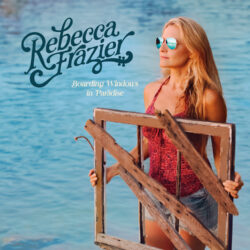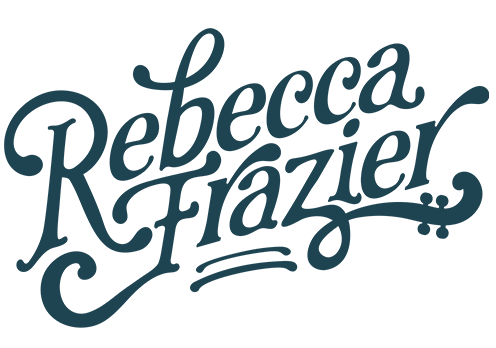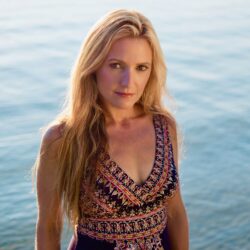- Biography -
REBECCA FRAZIER
Boarding Windows in Paradise
“Rebecca Frazier is an important voice among the group of women whose musical talents and creative visions are recasting bluegrass. A triple threat, she sings, plays, and writes with fire and grace, and her new record is not to be missed.”
Alison Brown (GRAMMY-winning banjoist & producer)
Grounded in her roots as a native Virginian, bluegrass trailblazer Rebecca Frazier found herself reawakening to a whole new journey of inspiration and invention. For the flatpicking luminary, who achieved notoriety in the music world as the first woman ever to appear on the cover of Flatpicking Guitar Magazine, that creative rebirth turned into her most captivating work yet: BOARDING WINDOWS IN PARADISE, releasing Sept. 13 on Compass Records.
The album title seems appropriate, as Frazier stepped into these last years with more strength and intention than ever before. Like the generations of her ancestors who have lived along Virginia’s coast, she, too, has weathered life’s hurricanes and battering winds — and witnessed its luminous beauty — and she wanted to capture that juxtaposition on this record.
“The paradox presented in the last line of ‘Hurricanes,’ the album’s closing song—’We just keep on living here, boarding windows every year in paradise’—that’s what pushed me to my current space,” Frazier explains. “The realization that I can create my own paradise through daily maintenance, daily actions—and yes, if it’s paradise, if it’s innately perfect, why should I have to work at it? But that daily, deliberate initiative is a gift of choice.”
Embracing creativity in her present moment brought it boiling to the surface with a newfound energy and a heightened knowledge of the important things in her life. She spent time honing her craft in such a detailed way that now she is sharper, more in tune with herself and living with more clarity than ever.
While she didn’t intend to wait a decade to follow up her last album, the highly regarded 2013 Compass release, When We Fall, Frazier was following her gut. “I focused on being a supportive mom, playing select shows, and refining my own craft,” she says. “I went into a deep dive with my writing and my guitar—learning songs and legendary solos for inspiration—doing that kind of introspective work that just takes time and you can’t do when you’re traveling all the time.”
Now, her kids aren’t young anymore, and being there for them as they grew has been one of the most rewarding times of her life. “You think when you’re in the midst of raising small children that it will be there forever and it’s not,” she says. “Being present with them has been my goal. I wasn’t comfortable missing a recital or birthday party. I enjoy making music as part of daily life, singing three-part harmonies in the car or around the dinner table. We play concerts together. These experiences create a bond between us that I hope they’ll carry with them once they’ve grown up and moved on.”
 Once she knew what she wanted to say, her direction for the new album became clear. The title, Boarding Windows in Paradise, is a metaphor speaking to the changes occurring in her own life during this time and the resilience that often lies on the other side of closing one chapter and opening another. Being real and true was a top priority for her.
Once she knew what she wanted to say, her direction for the new album became clear. The title, Boarding Windows in Paradise, is a metaphor speaking to the changes occurring in her own life during this time and the resilience that often lies on the other side of closing one chapter and opening another. Being real and true was a top priority for her.
“Authenticity was one of the most important parts of this new project,” she says. From the songwriting to the musicians, to the sounds and instrumentation to who she worked with as producer, all the pieces needed to come together with strength while still being unapologetically true to the person she had become.
Frazier’s bond with GRAMMY-winning producer Bill Wolf was the catalyst. The two developed a deep friendship and bond that was necessary and pivotal for her to make the album she wanted to make. Wolf, legendary in bluegrass and acoustic circles for producing most of Tony Rice’s albums and engineering Grateful Dead albums, brought a purity and understanding to the project that she had been seeking and was grateful to find.
“Bill and I have a similar approach to artistry, and we clicked right away,” Frazier recalls. “I’d been craving that old-fashioned style of making an album—the kind where you hang out together outside the studio and both feel an energy and investment in the project. Looking back, there’s no one else who could’ve done this. Bill throws his heart, soul, and intellect into everything he does.”
Inspired by her transformative decade living in Colorado, the album opener “High Country Road Trip” invokes majestic Rocky Mountain scenery while posing questions about living in the moment as one is considering life-changing decisions.
“My whole life has been a counterpoint of going with my gut and enjoying the moment while also considering intention and the bigger picture,” she explains. “I grew up on the water. I love going with the flow and being taken for a ride. But I’ve got that philosophical side, where I’m also asking, ‘Where is this leading?’ This song is meant to capture that moment of joy somewhere in the middle: that elevated feeling of loving the lightness of not knowing what’s around the bend, and not necessarily trying to create a specific outcome.”
The recorded outcome of “High Country Road Trip” exceeds Frazier’s and Wolf’s expectations, although they had a clear vision for the song. “In the studio with legends Béla Fleck, Sam Bush, Stuart Duncan, Josh Swift and Barry Bales, our charts looked like a mess,” Frazier laughs. “We were percolating with ideas, and even though I’m guessing we overwhelmed them, they interpreted all of our ideas and added their own creativity, like the A-game professionals they are. The result is beyond my wildest dreams—especially the improvisational sections that emulate driving over a breathtaking mountain pass.”
The song “It’s Over,” a Roy Orbison original, had been in Rebecca’s mind since she first heard it on the radio. “I sat on this song for 20 years,” she says. “I loved Orbison’s soaring voice and soul-wrenching lyrics. I chose the song before I ever got married and now know that life has all kinds of seasons of beginnings and overs,” she says. “Bill brought the song to life in an almost cinematic way, providing heartfelt arrangement ideas with the instrumentation from Ron Block, Barry, Stuart and Josh.”
“Make Hay While the Moon Shines,” which Frazier wrote with bluegrass heavy-hitters Jon Weisberger and Bob Minner, is another celebration of experiencing the here and now. The song evokes moonlit anticipation and high-spirited, light-hearted mirth. “I had a blast writing with Jon and Bob. I love the spirit of yodeling through the hook,” she says. “Growing up in Virginia and spending much of my childhood by the Chesapeake Bay, I’ve always felt an ethereal connection to the moon. To me it feels like there’s magic in the air when the moon is full.”
the here and now. The song evokes moonlit anticipation and high-spirited, light-hearted mirth. “I had a blast writing with Jon and Bob. I love the spirit of yodeling through the hook,” she says. “Growing up in Virginia and spending much of my childhood by the Chesapeake Bay, I’ve always felt an ethereal connection to the moon. To me it feels like there’s magic in the air when the moon is full.”
Wolf suggested reaching out to Béla Fleck, Sam Bush, Stuart Duncan, Barry Bales and Josh Swift. “This was the first song we laid down with them,” Frazier recalls. “I think these guys read the mood and nailed it right away. When Bill asked them to build the spirit of anticipation with their climactic improvisation, they provided that energy and then some! I love the way this song came together, from start to finish.”
She recorded Madonna’s ‘80s classic, “Borderline,” with the band Love Canon in Virginia with Duncan playing fiddle. With Frazier’s unique flatpicking appended to the track, the driving instrumentation gives the listener the feeling that perhaps the song, which speaks to love pushed to its edge, belonged to bluegrass all along.
One can also feel the drive of forward momentum on “Train Is Moving,” co-written with Lisa Aschmann, a physicist turned songwriter. “I always wanted to write a train song,” Frazier says. “It’s about time and how it keeps progressing whether we jump on or not. We can either move on, transform our reality, or be pushed along passively. I was forced to reinvent, so for me it was a new season.”
With “Seasons,” she offers some insight into the heartbreak of life’s journey and asks pivotal questions about holding on to love. “‘Seasons’ was inspired by my grandmother’s life,” Frazier says. “She was divorced in 1950 and didn’t pass away until 1990. In all that time, she never moved on. I realized you grow into new seasons intentionally. There’s a vulnerability in reinventing what you want of your own reality. Reframing with myself was a turning point.”
The lilting, lighter fluttering feel of “Cantie Reel” gives a hopeful instrumental vibe as the album heads into “Available,” a bluegrass romp with Trey Hensley guesting on vocals and lending a lighthearted, tongue-in-cheek take on the meaning of wearing a wedding band.
 The authenticity of what Wolf brought to the process is on display in the album’s closer, “Hurricanes,” a metaphor for intentionally maintaining priorities in life. “We discussed having water and coastal sounds for this track,” Frazier mentions. “I suggested we find a pre-recorded water sound, but Bill refused. So we made a day trip out of it. We packed a picnic, drove to Virginia’s Eastern Shore and spent all day gathering recordings of waves, crickets and birds. This was for a three-second clip of audio. With Bill, you’re never going to get a shortcut; it’s not in his nature. He possesses integrity of the highest quality in every aspect. I’ve never met anyone with Bill’s integration of humanistic passion with an almost rocket-scientist approach to audio precision and detail,” she says. “On top of that, he’s witty and keeps me laughing. I feel blessed to have him in my life. My kids call him ‘Uncle Bill’ and he signs his birthday cards, ‘U.B.’”
The authenticity of what Wolf brought to the process is on display in the album’s closer, “Hurricanes,” a metaphor for intentionally maintaining priorities in life. “We discussed having water and coastal sounds for this track,” Frazier mentions. “I suggested we find a pre-recorded water sound, but Bill refused. So we made a day trip out of it. We packed a picnic, drove to Virginia’s Eastern Shore and spent all day gathering recordings of waves, crickets and birds. This was for a three-second clip of audio. With Bill, you’re never going to get a shortcut; it’s not in his nature. He possesses integrity of the highest quality in every aspect. I’ve never met anyone with Bill’s integration of humanistic passion with an almost rocket-scientist approach to audio precision and detail,” she says. “On top of that, he’s witty and keeps me laughing. I feel blessed to have him in my life. My kids call him ‘Uncle Bill’ and he signs his birthday cards, ‘U.B.’”
This meaningful collaborative effort resulted in an album illustrating strength in moving forward. “I was finding my way through my own seasons and was inspired by other people going through theirs as well,” she says. As the pivotal line in “Hurricanes” says so perfectly, “we were made to handle this.” Frazier’s music shows that the best is sometimes on the other side of the journey.
“It’s only icing on the cake that I’m proud of the end result,” Frazier says. “I’m grateful for the journey of this creative experience.”
###









